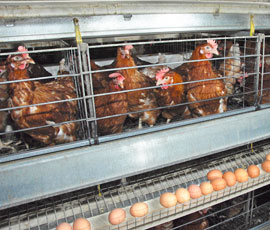Consumers call for better labelling on egg products

A survey has found that 69% of consumers want products containing eggs to be labelled free range, barn or caged, and state country of origin on the packaging.
Animal welfare charity FOUR PAWS commissioned the survey as part of its work to encourage consumers to buy free range, and said food that contained egg products from caged hens or otherwise should be clearly labelled.
Angelique Davies, a spokesperson for the charity, said: “If it doesn’t specify on the ingredient list that the eggs are free-range or barn, you can assume they are likely to have come from battery eggs.”
Ms Davies said a number of European countries were flouting the ban on conventional cages, but added that FOUR PAWS did not support enriched colony cages either.
“[Enriched] cages still severely restrict the movement and natural behaviour of the hens, and the additional usable space provided for each bird is only equivalent to the size of a mobile phone,” she said.
British Lion egg processors supported the call for better labelling, and said it was “already lobbying for egg products to be clearly labelled with the system of production, as is already the case for all retail shell egg packs”.
But it rejected the claim that enriched cages provided little more than the space of a mobile phone, pointing out that they afforded an additional 200sq cm a bird over conventional cages, as well as a range of other welfare improvements.
Ian Jones, chairman of the British Lion egg processors, said: “While Italy and Greece continue to flout the EU Welfare of Laying Hens legislation and some countries met the legislation by enriching existing conventional cages, British producers have gone a step further to ensure that all cage-produced eggs and egg products come from hens housed in genuinely higher-welfare enriched colony cages.
“All British Lion cage eggs were compliant with the legislation in January 2012 and come from hens housed in enriched colony cages, which include a nesting area, litter for scratching and perches. The increased size of the colony, housing 60-80 birds, allows better use of the shared space and provides hens with more freedom to express natural behaviours, including stretching their wings.”
